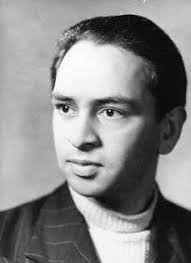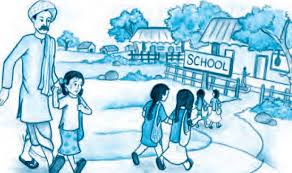Themes & Issues in Untouchable by M.R. Anand
Que. Discuss the issues and themes of the novel Untouchable by MR Anand.
Or
Q. What is the theme of M.R. Anand's novel Untouchable?
| Mukul Raj Anand |
| Profile |
|
| Born |
12 dec 1905, Peshawar |
| Died |
28 Sep 2008, Pune |
| Era |
20th century |
| Genre |
Realistic fiction |
| Notable works |
Untouchable, Coolie, Seven ages of man |
| Awards |
International peace prize, Padma Bhushan, sahitya akademi award |
| Founded |
MARG |
Introduction : Untouchable & its Theme :
The novel untouchable published in 1935 is a short novel (novella) by Mulk Raj Anand in the Indian English literature. M R Anand along with RK Narayan and Raja Rao forms the great (major) trio.
The novel untouchable is one of the most celebrated novels in Indian English literature. It renders a realistic depiction of the life of an untouchable boy named Bakha who was a sweeper by profession, an untouchable. It's Central theme deals with social evils such as Untouchability, caste based discrimination and social subordination of marginalized sections.
The novel untouchable is the story of a single day in the life of Bakha. It presents the account of the humiliation and struggle that he and other lower caste people had to go through.
These sections of people suffer a lot, because they are by birth regarded as outcast by others. Mulk Raj Anand has brought to limelight the artificiality and hypocrisy of the upper caste men, especially the man like Pandit Kali Nath, who preach good things in life but are corrupt to the core.
Novel
|
Untouchable |
| Written by |
Mulk Raj Anand |
| Main Character |
Bakha |
| Created by |
M. R. Anand |
| Era |
20th century |
| Father |
Lakha |
| Sister |
Sohini |
| Others |
Rakha, Hutchison, Kalinath, Charan Singh etc. |
| Genre |
Realistic Fiction |
Themes of Untouchable:Theme of UntouchabilityTheme of Social realismTheme of Caste discriminationTheme of Social segregationTheme of Subordination of marginalized sectionsTheme of Humiliation & Exploitation |
Themes of Untouchable
The novel Untouchable is a realistic fiction. Its theme is based on the depiction of misery and plight of the untouchables, their social segregation and reduced existence with customary humiliation. Various social evils and issues have been highlighted by the novelist through this novel. Let's discuss them one by one :
Theme of Social Segregation :
Mulk Raj Anand's primary purpose in writing the novel untouchable was to bring about a change in the perception that people had in their mind regarding the untouchables.
In his Novel we get the description of the un congenial place where these untouchables live. The absence of drainage system had, through the Rains of various Seasons, made the quarter a marsh which gave out the most offensive smell. The people of the untouchable castes are washer men, grass cutters, sweepers, barbers and others who lived in a confined world to each other and socially isolated from the rest of the village.
Theme of Untouchability:
The plight of the untouchables is depicted through the character of Bakha. We are told that how accidentally one day he touched an upper caste Hindu in the market and the person became infuriated that he abused Bakha by addressing him such words as son of swine, dirty dog and so on.
Everyone present in the situation just saw him getting insulted but no one spoke a single word against it. Bakha was so ashamed. He fell down on his knees and silently listened to all the insults that was targeted towards him. At the last a Muslim tongawallah rescued him from the situation. Bakha was so Shattered by the incident that he burst out into anger, "why are we always abused? Because we are sweepers. Because we touch dung. They hate dung. I hate it to".
Untouchability is one of the most evil practices of caste system in India which prevails even today in many of the socially and economically backward places. Some great personalities like Dr. Ambedkar and Gandhiji have spoken on this issue and its eradication from the society for the upliftment of the people.
They have pointed out that no society can ever make a progress if its people are prejudiced against this kind of casteist mentality.
In the course of the novel we see Gandhi appearing in the scene in one of the last scenes and he delivers a lecture on untouchability and convinces the people to leave this practice and encourages Bakha and other people in his community.
Theme of Social realism :
The central character of the novel Bakha is ill treated by the high caste people throughout the novel. The novel comprises of events of a single day in his life. From the morning itself we are given the glimpse of how he is subjected to abuse and treated like an animal.
This deplorable condition of the untouchables presented by Anand is experienced every day by them. He has realistically depicted the problems faced by untouchables. He is not quixotic about his principles and ideology. He is very pragmatic and realistic in his approach to the problem of untouchability.
The element of social realism has been presented with great precision. It shows Anand's own experience of the untouchables and their surroundings. As a child he used to play with the untouchable boys. Only a person having the first hand experience of these problems can give such a realistic depiction.
Theme of cast discrimination:
Untouchability and caste based discrimination go hand in hand. Throughout the novel we get the glimpses of discrimination arising out of hierarchical position of Castes, whether we look at Bakha or her sister. Bakha's sister is not allowed to draw water from the well. Similarly, high caste hindus throw away a packet of cigarettes at Bakha and when he is hungry, he is given chapattis in a way as food is thrown to a dog. His experience at a Marketplace with the upper caste is suggestive of how much the place was steeped with the caste discrimination.
Bakha is humiliated and helpless through this all, but he remains silent at the situation because he is helpless, there is nothing that he can do about it. Later his frustration is seen when he says,
"all of them abused, abused and abused. why are we always abused? because we are sweeper? Untouchable? I am an untouchable!".
Religion :
Religion plays an important role in the novel for we see its influence upon the people of the society to a great extent. Col. Hutchison advises Bakha to adopt Christianity to overcome his deplorable condition. However he is skeptical about converting his own religion and suspicious about the missionary's intension.
Critical analysis:
Anand captures the predicament of untouchables and presence the harsh reality before us. We see that they are denied even the basic needs of the life that is water. The novelist is indeed quite powerful in his rendering of the light on the untouchables with his acute observation and the regional language that he adopts. The use of regional language and abuses clearly shows the social realism with which he has presented the Curse of untouchability.
He also criticizes the people of upper caste in the course of novel. He tries to show how people are using religion as a basis for dividing the society into hierarchical orders and then misuse it for their own benefits.
Mulk Raj Anand in the novel through the character of Kali Nath successfully presents the hypocrisy and corruption that some people are engaged in the exploitation of ignorants and the downtrodden.
He shows how KaliNath invites Sohini under ill intentions then turns the blame onto her of polluting him. Through this episode Anand tries to present a harsh reality that not all the preachers of religion are morally right at their heart and that we should not welcome blind beliefs and caste discrimination in the name of religion.
Anand's primary concern was to a lift this lot of people who are socially unaccepted and isolated. By bringing in Mahatma Gandhi's episode Anand has not only provided a solution for the plight of the untouchables in the novel but also highlighted the evil practices that need to be removed from the society.
Gandhi's comments that the predicament of the untouchables is both a moral and the religious issue. He calls, "untouchability is the greatest blot on Hinduism" and regards it Satanic to think that anyone in Hinduism as born an untouchable.
Gandhi holds the view that untouchables have to cultivate the habits of cleanliness and be free from unhealthy practices such as drinking liquor and gambling. Gandhi regards all Indians as equal and expresses his desire to be reborn as an untouchable. Gandhi's words instil a ray of hope in Bakha and other people.
The closing of the novel appropriates bakha's inner conflict between the enthusiasm and his naivitie. This is a consequence of what bakha has experienced during the whole day and its indelible impact upon him.
Bakha's interaction with the poet Iqbal Nath Sarshar and his ideas about the flush toilet system also provide him with some hope for the future. The novelist hints that the situation of this exploited class will undergo a change in the future and they will no more remain exploited in the times to come.
.jpeg)
.jpeg)

.jpeg)
.jpeg)

.jpeg)




Comments
Post a Comment
Your Views and Comments means a lot to us.